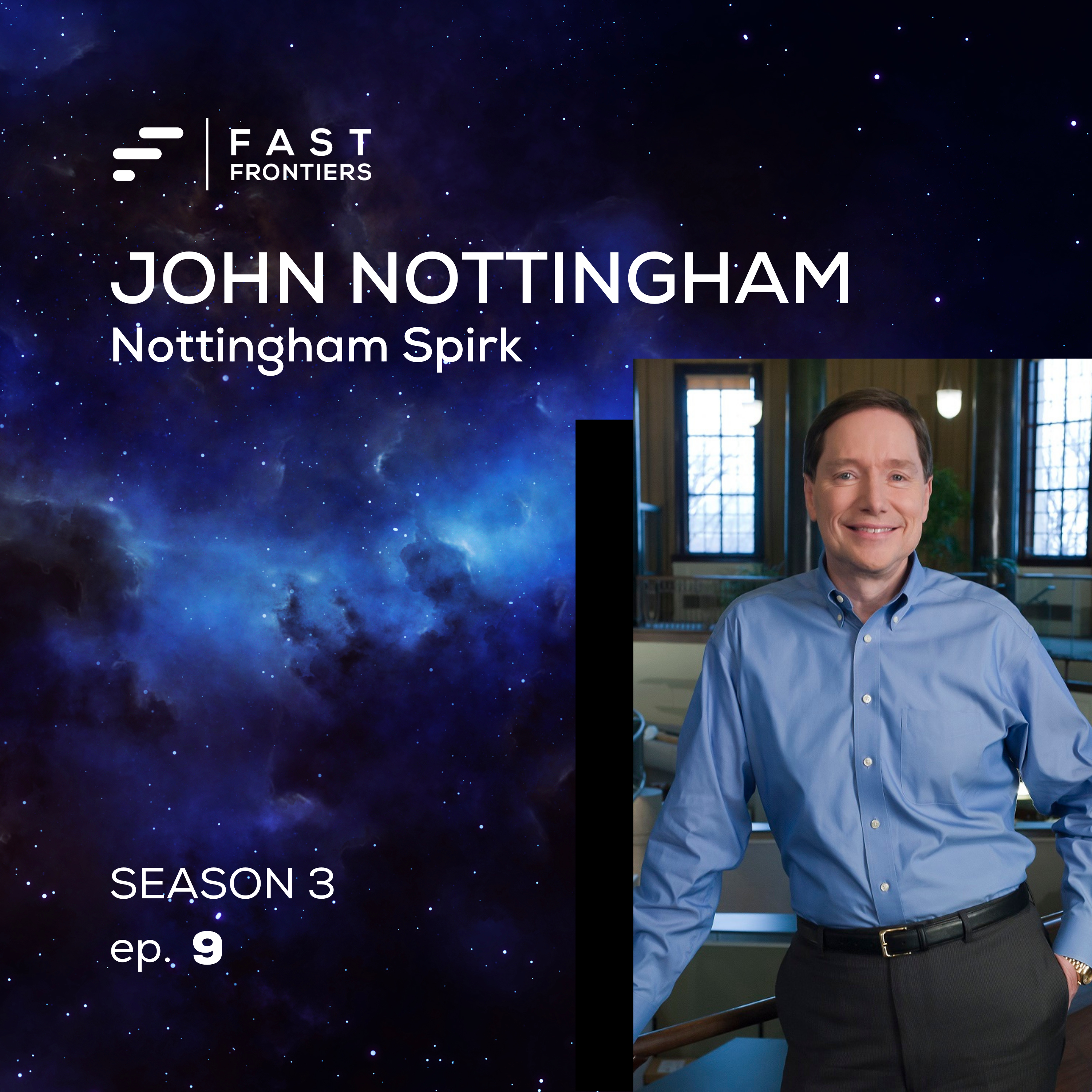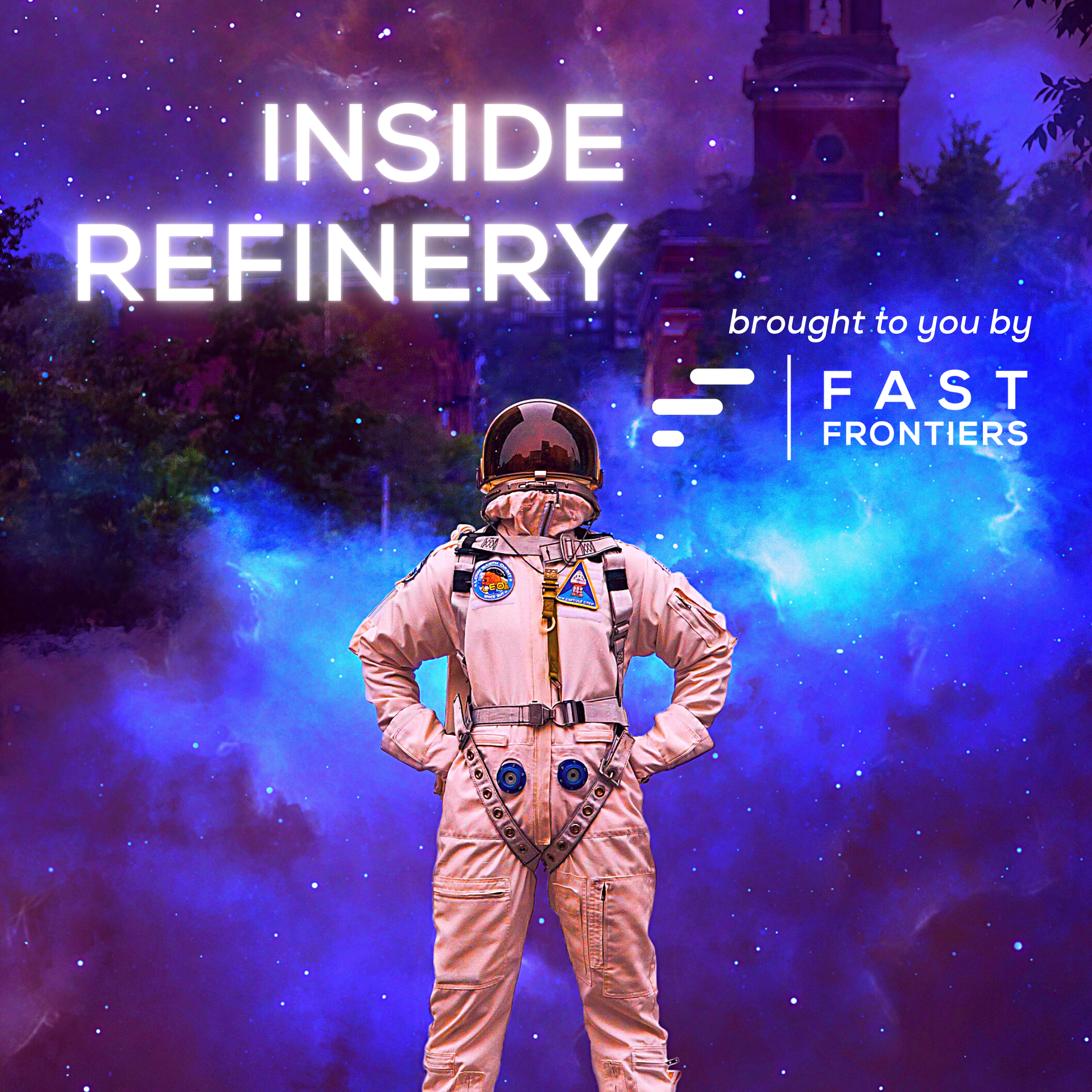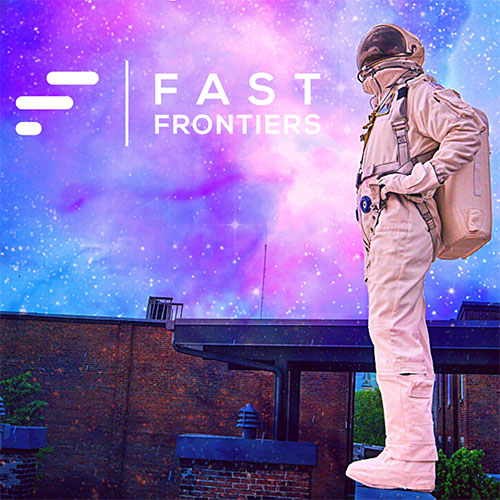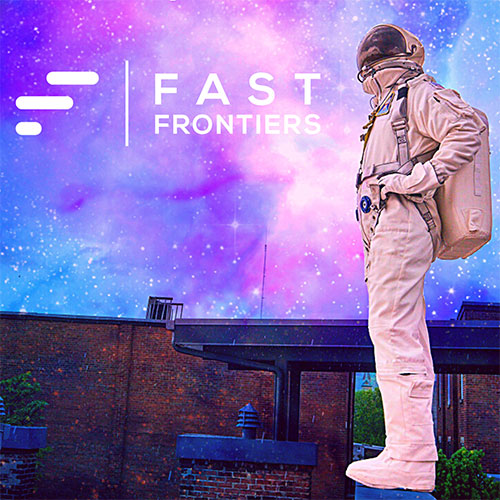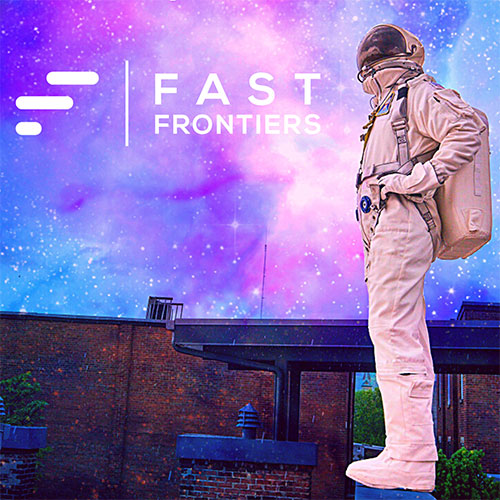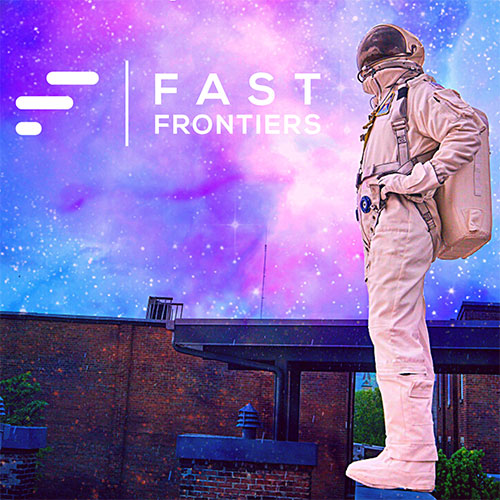S3 Ep 9. John Nottingham: Nottingham Spirk
- 0.5
- 1
- 1.25
- 1.5
- 1.75
- 2
Tim Schigel : Welcome to Fast Frontiers. I am your host, Tim Schigel, managing partner of Refinery Ventures. In this episode, we're talking with John Nottingham, co-president of Nottingham Spirk, the longstanding design collaborative and innovation center located in Cleveland, Ohio. In this episode, we're going to dive into the unique, vertical innovation approach that Nottingham Spirk uses to partner with companies to create new products. We're also going to talk about their new partnership with EY that will house their Global Center for Advanced Manufacturing and Mobility, and how innovation is really something you do 24 hours a day, or at least that's what John does. The biggest theme or so what I hope you take away from this conversation is how innovation is a continuous process. It's not a start-stop process that doesn't continue. You must relentlessly drive through to the finish line. Please enjoy my conversation with John Nottingham. All right. Well, I'm very excited to talk about innovation that Mr. John Nottingham. Thanks for joining, John.
John Nottingham: My favorite subject.
Tim Schigel : So your firm is fascinating. I'm a Cleveland native and familiar with you and we've gotten to know each other a little bit in the last few years. I'm a big fan of design and design-centric thinking and customer-driven design and you are globally recognized as one of the leading firms in that area. I'm wondering when you look back over the years at Nottingham Spirk, how has it changed in terms of the industry's demand for or appreciation for design-driven thinking?
John Nottingham: Well, I don't know if it's changed as much as it's evolved and any business evolves in accordance to what their customers and their customers' customers are wanting. I think the design thinking and design, it has to be agile, has to keep changing, has to keep looking forward. What worked yesterday, won't work tomorrow. So you keep fighting and keep doing and keep creating and it keeps you motivated.
Tim Schigel: So, I don't know if this qualifies for the Guinness Book of World Records with the 1300 patents and 95% are commercialized, but it's got to be close, share with us a little bit of your kind of secret sauce if you will, and what you think has made you so consistent in that innovation process?
John Nottingham: Well, so first of all, innovation is hard. It's not easy and what we've done and we've learned, and we've evolved what we call a vertical innovation process because when you create something out of nothing, you start with a blank sheet of paper, or you start with a customer need. Every one of them goes through a process and this process starts with that idea and ends with the commercialization to our customer. It's a process from start to finish and here's the thing: if it's an unbroken process all the way through, it can be successful. The problem is when you pause or when there's different groups. Let me just, as an example, remember the thing you did in school where you whispered something in somebody's ear and then they whispered it and then somebody else whispered and somebody else whispered-
Tim Schigel: The telephone game.
John Nottingham: ...and whatever the story was at the beginning is totally different at the end? What happens in innovation is you have a separate team doing design and they throw it over the wall to an engineer and they do their engineering and they throw it over the wall to a prototyper and the prototyper throws it over the wall to the toolmaker and the toolmaker throws it over the wall to a factory. By the time you end up, the designer doesn't recognize it all the way through. What we've done in Cleveland, we've created, again, a vertically integrated situation, both physically and programmatically, where we start and we relentlessly go all the way to the finish. It's funded all the way through. It's staffed all the way through. It's a continuous line from start to finish and that's why we have a 95% commercialization rate and that's really the reason for that success. I've seen it done other ways and it's just not as effective and I'll tell you how I learned it. About 20 years ago, I had the chance to visit Pixar Studios on the West Coast. If you read the story of Pixar, there's a book called Creativity, Inc, by Ed Catmull, who was the president of Pixar. But his partner was Steve Jobs and Steve Jobs was the big investor in Pixar. So they were able to lay out and create their headquarters and their headquarters was designed around vertical integration. If you read the book, he has a central core where everybody kind of goes together. They were stack tours around the central core and the writers and the animators and the actors and all these always bumped into each other and the directors, the producers would always interact vertically and they would handle the whole process from start to finish. Pixar has had an incredible success rate with whatever they produce. Well, that made an impression on us and so when before we moved to our current facility, we were looking for that kind of a facility. We found this historic landmark church building that had a central core, stack tours around it and we could do design engineering, prototyping, and so forth, even focus groups, bringing customers in and that sort of thing. We found that if we put everybody together, we can effectively go from start to finish and I think that is the reason for the success.
Tim Schigel: Well, I've had the privilege of visiting your office and so for any listener here that goes through Cleveland, give John a call because you, you definitely want to stop by and see it. It's really, really cool office.
John Nottingham: Our stakeholders and our client partners call it the 'Disneyland of Innovation.'
Tim Schigel: Absolutely, it is. So what would you say are some of the misconceptions or myths about that process that, I'd imagine, with some of your clients there's potentially some education or some barriers you have to kind of break through to get them to think a little differently?
John Nottingham: Yeah. Well, the biggest one is this whole idea of stage gate and we have to pause and we have to think about it and we have to this and we have to that. In innovation, if you stop, it's dead. It's so hard to keep going and all the way through and this stop-start thing just doesn't work with innovation. You have to be committed, you have to start, and then you have to relentlessly drive to the finish line, in my view.
Tim Schigel: So you've recently announced a partnership with EY-
John Nottingham: Yeah.
Tim Schigel: ...so clearly, they're recognizing this. Can you talk a little bit about how that partnership came together?
John Nottingham: EY, Ernst & Young, was actually founded in Cleveland. Of course, they're global. They're about a $38 billion consulting and audit company. We actually, about three years ago, won the EY Entrepreneur of the Year award there, and we attended their annual conference in Palm Springs. We got to know them and they got to know us and they were saying, "Whoa, we've never heard of anything quite like this." We're talking about vertical innovation process. They came to visit us. They were intrigued. One thing led to another, and it's resulted in this partnership where, on our west wing of our innovation center, we're currently under construction on the EY Nottingham Spirk Innovation Hub. That's going to house their Global Center for Advanced Manufacturing and Mobility right here in Cleveland, Ohio.
Tim Schigel: Wow. So when is this going to be in production, if you will?
John Nottingham: It'll open up this summer. We're going to have a grand opening this summer. You ought to come up and see it. It's stunning, Through the pandemic, nobody was constructing anything, right? We have a big crane up here. We're working hot and heavy. This is a big deal and it's going to be a lot of fun.
Tim Schigel: So your process, you apply it to both products and also business models, right? So-
John Nottingham: Correct.
Tim Schigel: ...a wide variety and the process pretty much stays the same, correct?
John Nottingham: Well, the process is the process. It's funny, I speak to MBA groups all the time in the college, the graduate school level. I always like to say, "There's one thing that every business needs, one thing and just give me one word," and they start shouting out, "Capital." "No." "An idea." "No. " A good management team." "No." "What is it?" "It's a customer."
Tim Schigel: Yeah. Absolutely.
John Nottingham: If you have a customer, you're in business, really. You have a customer willing to buy whatever you're selling, you're in business. When we start our process, we always start with the customer to the point where we have a facility in-house here, it's a focus group facility with a two-way mirror. We bring our prospective customer in that room and I have our designers or engineers from the other side of the two-way mirror watching that customer, watching her body language, watching her pain points, looking at the twinkle in their eye. She or he may not say what they're thinking, but you can read it on their face and that's where we start this qualitative idea of what a customer wants? Then we start from there. Then we go to design engineering, prototyping. In-house, we build the prototypes in-house. We find the factory, domestically or around the world. We do the digital orientation. We do the packaging, the commercialization plan, the business model, the whole thing, and get it to that customer in a relentlessly fast way.
Tim Schigel: But for the people listening, so they have an appreciation for this because the products and customers that you've had is a very wide variety.
John Nottingham: Oh, yeah.
Tim Schigel: So can you walk us through a few examples just to kind of demonstrate the range of products that you've been involved in?
John Nottingham: Oh my-
Tim Schigel: Products that everybody knows?
John Nottingham: Well, one of the ones we're most famous for is that we had the idea and commercialization of the first mass-market electric toothbrush, mass market. We're sort of the Henry Ford's electric toothbrushes. Back in the day when Henry Ford was around, he did the Model T. He gave cars to the masses. Well, back in our day, when we were looking at $100 Sonicare toothbrushes, which are great, but who wants to pay $100 for a toothbrush? Well, we figured out a way to create the first $5 mass-market electric toothbrush and we started a company called Dr. John's Spinbrush Company and I'm John and John Spirk is John. We had another John and a Larry. We started the company and we launched it independently. We sold the company to Proctor & Gamble and they rebranded it from Dr. John's to Crest. It became the Crest toothbrush. We sold hundreds of millions, 37 countries around the world. It's the most successful electric toothbrush of all time. That's one and how about Dirt Devil? Dirt Devil was a very small company. We helped to grow it to 400 million. That was acquired. We started with Little Tikes when they were doing a million that grew to 600 million. That got sold. Over the years, that's the kind of thing we've done is to work with Proctor & Gamble and Unilever and Kimberly Clark and GE.
Tim Schigel: So you had a good article on the Six Habits of Innovative People.
John Nottingham: Yes.
Tim Schigel: So for our audience, which consists mostly of entrepreneurs, can we go through those six habits because I think those are crosstalk
John Nottingham: Sure. Yeah. Yeah. So now you're going to make me remember that, aren't you?
Tim Schigel: I can prompt you. So the first one, the Clarity of Vision, and an Endless Pursuit of Knowledge.
John Nottingham: Yeah. So let me just say an overview. If you're in the innovation business like I am, I wrote an article one time. I said, "Innovation is not what you do on Thursday.? Okay? "Oh, it's Thursday. Let's be innovative." Innovation is what you do 24 hours a day. It drives my wife crazy, by the way, when we're on a vacation because I'm always thinking about, "Oh, gee. What if we did this and this...? "Stop already." But I'm driving in the car after commuting in here. I'm thinking about what we're to innovate or I'm reading an article or I see a program on something where that sparks my imagination and drive right into the innovation process. So I'd like to talk to you about relentless innovation. You just keep innovating and that's what is in your mind. You live it. It's not something you do-
Tim Schigel: Is your view that everyone in the organization should be involved in the innovation process or it's-
John Nottingham: I think so.
Tim Schigel: ...relegated to some special lab?
John Nottingham: No, no, no, no, no, no, no, no, no, no. Again, Steve Jobs did this Pixar thing. He famously said that a small percentage of innovations come from structured meetings, creative sessions and stuff, but more innovations come when you're casually thinking about something. You bump into somebody in the hall; you're taking a shower; you're driving through the countryside and all of a sudden something hits you. Almost every one of those 1,300 patents we've talked about, I can remember the time when we nailed it. We solved it. Let's make it. It hits you like a thunderbolt sometimes, but it's ongoing. It's relentless. It just can drive other people crazy, but it's what you do because everything's always changing. The customer's changing, now especially in the last year with the pandemic. My gosh, everything changed and so you've got to be able to be agile and react to the change.
Tim Schigel: Back to your Six Habits of Most Innovative People, Clarity of Vision. Second one kind of relates to this, Understanding They Need Help in Order to Build the Vision. So-
John Nottingham: That comes with the team, okay?
Tim Schigel: Yep.
John Nottingham: I can't do everything and I don't want to. I've got a great team here. We've got 75 people on staff. They're very good at what they do and I respect and appreciate what they bring to the party, but we all work as a unit. It's funny, as I mentioned, I'm on the board of the Cleveland Clinic and the Cleveland Clinic, it started out with four doctors. They actually have their 100th anniversary this year. They started out with four doctors working as a unit and for 100 years they still work as a unit. Everybody in the Cleveland Clinic is on salary. Everybody in the Cleveland Clinic has a one-year contract and reviewed every year, including doctors and they work has a unit, unlike other healthcare facilities. The only major one that I know of is the Mayo Clinic and last week, the Cleveland Clinic and the Mayo Clinic were voted the two top health care facilities, not just in the United States, in the world. Why? Because of the unit, because of the team. So we have this team here at Nottingham Spirk where we work as a unit. We all have different talents and things. I think our average tenure is about 15 years or more and we work together and we're in sync. You have to be when you innovate.
Tim Schigel: So number three on your list is interesting, then. So this now goes on a little detour, which is Generate Excitement and Remain a Constant Source of Inspiration. Why is that important?
John Nottingham: Well, because you're creating a future. it hasn't been done before. I've been doing it all my career and it's still hard, but I at the roadblocks, not as a roadblock, but as a challenge to figure out how do I get beyond that roadblock? And we will. We always get beyond the roadblock. We always figure out how to do it, but they do pop up there.
Tim Schigel: So number four, Large Scale Thinking and a Relentless Desire to Change the World. So this one reminds me of some of our job here in the Midwest, which is kind of flipping the script. Folks I know, they go out to Silicon Valley, what have you? They go there because they believe that they're going to change the world and we can do that here and now more than ever, you can do it anywhere.
John Nottingham: It's funny, we're doing this EY Nottingham Spirk initiative here in Cleveland. I can't tell you how many people are saying, "Oh, it's a breath of fresh air that something's happening in the Midwest." I love it and then they look and say, "Wow, you've got a low cost of living. You've got a work ethic." You've got all the good things that are in the Midwest and we're not crowded by all this other stuff that you have on the coast, so to speak. So I think the Midwest is due for a real resurgence. You talk about Silicon Valley, I think Cleveland is going to be manufacturing valley or the valley of making things. We're going to start making things, why? Because of factory 4.0. Again, this digitalization of we're going to be reassuring. We're going to be doing things with automation, a different mindset. You're going from Factory 3.0 to Factory 4.0.
Tim Schigel : There's actually a Jeffrey Immelt, former CEO of GE mentioned that because of offshoring, we've basically given up a generation of craftsmanship and know-how in terms of making things.
John Nottingham: That's right.
Tim Schigel: But that hasn't left Cleveland-
John Nottingham: It hasn't left Cleveland.
Tim Schigel: There's a history- Not here at Nottingham Spirk, that's for sure.
John Nottingham: Okay. Number five: Open-mindedness and a Willingness to Change at Any Second. Any second. I walk in here every day and I'm open to what's going to happen.
Tim Schigel: How did you learn that lesson? How did you learn that lesson?
John Nottingham: I guess I've always been like that. I've always been looking at what's next, what's next, what's the next thing? It's funny when the pandemic started about a year ago, everybody was buying hand sanitizer and I noticed that you go to a hand sanitizer and you put your hand on the pump and pump the hand sanitizer, but what hand pushed that pump the last time it was used, especially in a public place? I'm going, "This is not right." So we pivoted and we invented a no-touch hand sanitizer package where you can deliver the entire thing, but you put your hand there, it delivers the hand sanitizer. You do not touch it at all and so we were able to produce it, launch it last year and you can go to Lowe's and CVS and BJ's and so forth and they're stacked to the ceiling.
Tim Schigel: That's moving fast.
John Nottingham: And we're making millions off them right now.
Tim Schigel: Wow. So that was something that, obviously, at the beginning of the pandemic, you had no idea how long it was going to last.
John Nottingham: No.
Tim Schigel: So that took some commitment to say, "Hey, this is going to be around for a while. This is worth the effort."
John Nottingham: Well, I think that's a better product anyway. I would rather not touch something that's going to dispense anyway, I don't care if there's a pandemic or not.
Tim Schigel: It's just better.
John Nottingham: It's just better.
Tim Schigel: Yeah. Great point. All right. Number six, Hardworking and a Commitment to Self- improvement.
John Nottingham: Always, every day. One of the things, I was looking at somebody talking about health and wellness and longevity and they'd listed all those things. One of them was getting up every day with a purpose. That is a key to longevity. Think about it. You get up every day with a purpose and we certainly do and everything is different. Every day is different, but self-improvement and pushing yourself out there especially if you're an innovator in the innovation business, that's key.
Tim Schigel: Yeah, who doesn't want to be in that kind of business, right? So-
John Nottingham: Oh, it's fun.
Tim Schigel: What would you share with other entrepreneurs as they think about their market potential and market size? Because I noticed everything you've talked about here, so far, you're not talking about thousands of customer; you're talking about millions or tens of millions of customers?
John Nottingham: Yes, and with SpinBrush, it was billions of customers, but I digress. John Spirk, my partner, my able partner says, and he's great at these little sayings, "It's just as hard to develop a little idea as a big idea." So he goes, "Spend your time doing it. It might as well be a big idea." You want a big market. That what's going to jazz people. You want to affect as many people as possible with your idea. You don't want a passion project. You don't want a little tiny market. You want a big market and that's what we do.
Tim Schigel: So we talked about the off-showing and when you think about, for the U.S., for this country, for us to continue to have that edge in innovation, what other advice would you share with innovators and entrepreneurs around the country?
John Nottingham: Yeah. Well, all right. So think of how many thousands and thousands of factories we have in the United States. The vast majority is what I would call Factory 3.0, they're basically, they're mechanical. They're somewhat computerized, but they don't talk to each other. Every one of those factories and the next 10 years are going to go from 3.0 to 4.0. Now what's 4.0? You have a factory that all the machines are automated. They're digital. They all talk to each other. That use AI. There's something that the person running the factory has in his office called a digital twin. That, basically, it has elements on his screen that is a digital twin of every single device in the factory. If he wants to play around with efficiency of the production, he can play around with it on his screen before it's used in the factory. All of a sudden, everything is working. I think the next 10 years, we are going to have a renaissance in the United States to do manufacturing here. Technology is going to drive it and it's going to be real exciting.
Tim Schigel: So you mentioned Case Western Reserve. What should our universities be doing or thinking about to prepare that future workforce?
John Nottingham: That's a very good point. Everybody is talking about talent and they have to stop thinking about manufacturing as this blue-collar thing. It is high-tech. It is something that is a great profession to get into and it's good to have hands-on experience. Now, University of Cincinnati, in your neck of the woods, has a great program, this co-op program, where they have a semester in class and then a semester in a company. I think that's wonderful. We actually recruit designers from the University of Cincinnati and have had a program here. Some of them actually, they're full-time employees here. That's the real world versus the academic world and the more you can get real-world experience for students, the better off it is.
Tim Schigel: Yeah. Well, two of my kids went through that program and that interactive, immersive learning and then when they go back to school, they can apply it. They can understand," Oh, this is why I'm learning this stuff." Right? crosstalk esoteric.
John Nottingham: I think it's wonderful, and part of what we're doing with the EY Innovation Center here is we're going to do an advanced manufacturing technology training center here for college students.
Tim Schigel: But I know there's more initiatives going on within even the state of Ohio around AI and the future of AI and you think, "Okay. Well, who needs to understand what AI is other than software developers?" You're pointing out right here. You may not be building the AI, but you need to understand how it works.
John Nottingham: Well, AI is software, so yeah, what we're doing is when we're developing a device, the software is something we're doing and the AI is something we're building in. It goes hand-in-hand with what we're doing.
Tim Schigel: John, thank you. This has been a fascinating discussion. You guys are doing so much cool work. I encourage everybody listening to go to your website, check it out, visit you if you're in Cleveland. Thank you very much for sharing with our audience today.
John Nottingham: Well, thank you, Tim.
Tim Schigel: Thanks for listening to Fast Frontiers. If you like our show and want to know more, check out our website, fastfrontiers.com. If you enjoyed this episode, please share it with others and give us a rating and review on your favorite podcast platform. Join us next week when we bring you my conversation with Brian Hopcraft, Managing Director at Lewis & Clark Ventures. The Fast Frontiers podcast is brought to you by Refinery Ventures. Our producer is Abby Fittes. Audio engineering by Astronomic Audio. Marketing, content, and social media support from Content Callout and our podcast platform is Casted.
DESCRIPTION
In this episode, we're talking with John Nottingham, Co-President of Nottingham Spirk, the longstanding design collaborative and innovation center located in Cleveland, Ohio. We're going to dive into the unique, vertical innovation approach that Nottingham Spirk uses to partner with companies to create new products. And we will talk about their new partnership with EY that will house their Global Center for Advanced Manufacturing and Mobility.
Today's Host

Tim Schigel
Today's Guests


